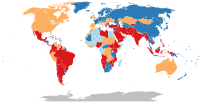
Photo from wikipedia
Background: since the coronavirus disease (COVID-19) was first reported in 2019, South Korea has enforced isolation of patients with confirmed cases of COVID-19, as well as quarantine for close contacts… Click to show full abstract
Background: since the coronavirus disease (COVID-19) was first reported in 2019, South Korea has enforced isolation of patients with confirmed cases of COVID-19, as well as quarantine for close contacts of individuals diagnosed with COVID-19 and persons traveling from abroad, in order to contain its spread. Precautionary behavior practices and psychological characteristics of confirmed and quarantined persons were investigated for planning pandemic recovery and preparedness. Methods: this study was conducted with 1716 confirmed patients and quarantined persons in Daegu and Busan, regions where a high number of cases were confirmed during the early stage of the COVID-19 outbreak in South Korea. We collected online survey data from 23 April to 20 May 2020, in Daegu, and 28 April to 27 May 2020, in Busan, in cooperation with Daegu and Busan Infectious Disease Control Centers and public health centers in the regions. COVID-19 symptoms, pre-cautionary behavior practices, psychological states, and the need for improvement in isolation/quarantine environments were examined using an online survey. Results: compared to patients infected with coronavirus, quarantined persons engaged in more hygiene-related behaviors (e.g., hand washing, cough etiquette, and proper mask-wearing) and social distancing. COVID-19 patients had a strong fear of stigma, while quarantined persons had a strong fear of contracting COVID-19. Study participants responded that it was necessary to provide financial support and adequate information during isolation/quarantine. Conclusions: the study highlights the importance of precautionary behavior to prevent COVID-19 infection and the need to provide support (both psychological and financial) to patients and quarantined persons, to reinforce effective communication, social solidarity, and public health emergency preparedness (PHEP) in a pandemic situation.
Journal Title: International Journal of Environmental Research and Public Health
Year Published: 2021
Link to full text (if available)
Share on Social Media: Sign Up to like & get
recommendations!